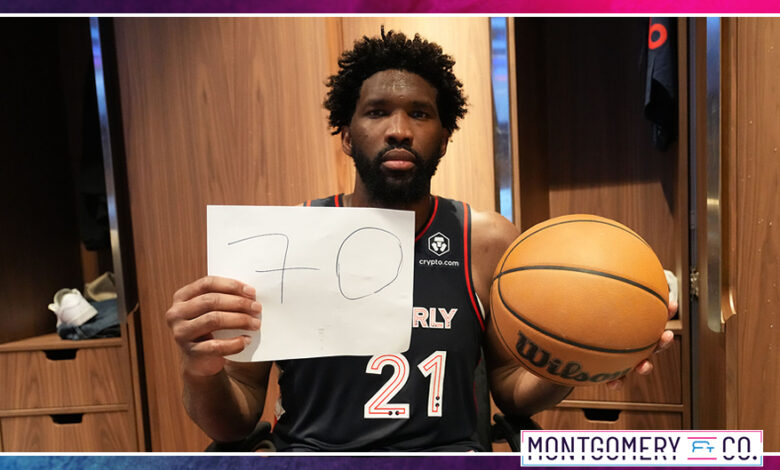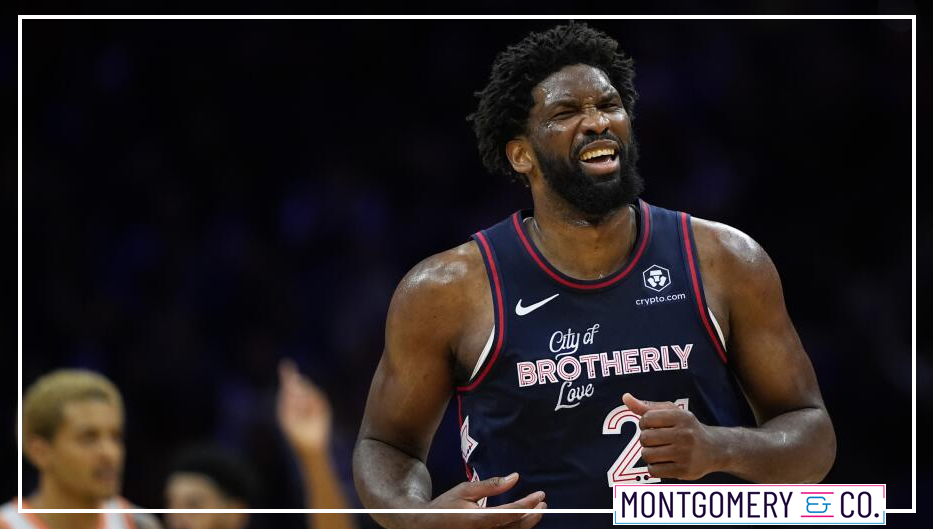
NBA Recap: Seventy?!
Ya boy (it me, ya boy) is back with another recap of the NBA season thus far. In this installment, I’ll discuss Philadelphia 76ers franchise cornerstone and last year’s MVP Joel Embiid scoring 70 points on January 22nd.
Let’s establish the most important fact here: 70 points is a lot of points by one person in a basketball game. Yes, I know that’s obvious. But let’s lean into those ways why that’s obvious for a paragraph or two. Embiid took 41 official field goals, making 24, and 23 free throws, making 21. That is 65 total shots, not including any attempts negated by getting fouled. That’s more shots than total minutes in the game, a game where 20 other players took at least 1 field goal, as well as more points than minutes Embiid plays. He raised his league-leading scoring average to 36 a game, while still only playing less than three quarters of basketball a night. The sheer output of offense is remarkable. Then, factor in how physical it is in the paint. I know the NBA isn’t as physical as a generation ago, but it is still a contract sport in which the bigger players are not officiated the same way as smaller players—especially if they’re as aggressive as Embiid is. Embiid may be good at drawing fouls, but being physically imposing allows for lighter players to hit him a little harder than, say, the average NBA guard. If a center was officiated like a point guard, Embiid would foul everyone out by halftime. So to endure that and still remain efficient enough to score 70 points is truly amazing. Just ask Kevin Durant, who scored 43 points on the same night.

Performances like Embiid’s 70, Karl-Anthony Towns’ 62 on the same night and several others over the past few seasons may cause a part of the basketball contingency to lament the idea that players do not play as much defense as the NBA of yesteryear did. While there may be some evidence of that in some cases, the most important fact to me is that there are more offensive threats on the floor on a nightly basis. No, not every player is an elite scorer capable of averaging 30 a night. But most players generally look to score if left unattended. This results in much more space for superstars to operate on offense. And once a player of high caliber is on a heater, we get the outbursts of points we’ve seen. The number of 70+-point games in NBA history has doubled in just a little more than the past year. That is certainly a sign of different times, but it’s not just because players refuse to try on defense. We just watched the In-Season Tournament and applauded how hard everyone seemed to play. I don’t think that changed in the month since then. Sometimes, the great ones are really great.
Let’s do some Till Takes
At the time I started writing this, need broke that the Milwaukee Bucks relieved Adrian Griffin of his head coaching duties. Griffin was 43 games into his first-ever tenure at the helm, with the Bucks going 30-13 in that stretch. Apparently, it was not enough as Doc Rivers, who was serving as an informal consultant for Griffin while also being an ESPN in-game analyst, was hired as Griffin’s replacement. How we may feel about the optics of that sequence of events, if a change was necessary, then it was necessary. Whether or not Doc Rivers is an improvement is currently inconsequential to the fact that the Bucks’ players and front office believe him to be one. It stinks for Griffin to not get a chance to go a full season. But if championships are the goal, sometimes the moves made in pursuit of that goal will feel like harsh sacrifices. We will see what the Bucks do from here, but it certainly feels like they wanted new energy around the team.
One of the things I do not like about the discourse when it comes to comparison (see: “G.O.A.T.,” “most valuable,” etc.) is that there is no defined criteria. Usually, one’s personal bias taints the perspective, and we try to use factoids to confirm our feelings. However, whatever quantifiable measures that determine who is, “most unguardable,” OKC’s Shai Gilgeous-Alexander meets them all. His numbers of raw scoring are right there with anyone’s, as he is in the midst of his second-consecutive season of averaging at least 30 points a game. He is one of the best post-up players, which is incredible since he’s a perimeter player in a league that has gone away from most of its scores utilizing that part of basketball. It does not matter what kind of defender is in front of him. I repeat: it does not matter what kind of defender is in front of him. He is rarely made to do something he does not want to do on that court. His pace is remarkable—you can’t speed him up or slow him down. And plus, after he gives an opponent buckets, he’ll give us an amazing social media caption.
That’s it for this edition of the NBA recap. See you next time with the next update.